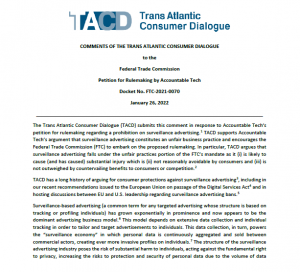 The Trans Atlantic Consumer Dialogue (TACD) today submits its comment in response to Accountable Tech’s petition for rulemaking regarding a prohibition on surveillance advertising. TACD supports Accountable Tech’s argument that surveillance advertising constitutes an unfair business practice and encourages the Federal Trade Commission (FTC) to embark on the proposed rulemaking. In particular, TACD argues that surveillance advertising falls under the unfair practices portion of the FTC’s mandate as it is likely to cause (and has caused) substantial injury which is not reasonably avoidable by consumers and is not outweighed by countervailing benefits to consumers or competition.
The Trans Atlantic Consumer Dialogue (TACD) today submits its comment in response to Accountable Tech’s petition for rulemaking regarding a prohibition on surveillance advertising. TACD supports Accountable Tech’s argument that surveillance advertising constitutes an unfair business practice and encourages the Federal Trade Commission (FTC) to embark on the proposed rulemaking. In particular, TACD argues that surveillance advertising falls under the unfair practices portion of the FTC’s mandate as it is likely to cause (and has caused) substantial injury which is not reasonably avoidable by consumers and is not outweighed by countervailing benefits to consumers or competition.
TACD has a long history of arguing for consumer protections against surveillance advertising, including in our recent recommendations issued to the European Union on passage of the Digital Services Act and in hosting discussions between EU and U.S. leadership regarding surveillance advertising bans.
Surveillance-based advertising (a common term for any targeted advertising whose structure is based on tracking or profiling individuals) has grown exponentially in prominence and now appears to be the dominant advertising business model. This model depends on extensive data collection and individual tracking in order to tailor and target advertisements to individuals. This data collection, in turn, powers the “surveillance economy” in which personal data is continuously aggregated and sold between commercial actors, creating ever more invasive profiles on individuals.
The structure of the surveillance advertising industry poses the risk of substantial harm to individuals, acting against the fundamental right to privacy, increasing the risks to protection and security of personal data due to the volume of data processed, and facilitating a rise in manipulation, discrimination, disinformation, radicalization, and fraud. Any potential commercial benefits of surveillance advertising pale compared to the sheer volume of harm.
More:
- TACD’s Comments to the Federal Trade Commission Petition for Rulemaking by Accountable Tech
- TACD’s Resolution on Behavioral Advertising (2011)
- TACD’s Resolution on Regulating Digital Services (2021)
- Watch: TACD’s #TransatlanticDiscussion ‘Time to ban surveillance advertising’ with MEP Alexandra Geese and Congresswoman Lori Trahan (2021)
